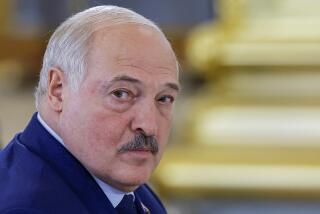Corruption Fighter Leads Belarus Vote : Election: Alexander G. Lukashenko, 39, takes 45.1% of the ballots in a political upset. He favors closer ties with Russia.
- Share via
MINSK, Belarus — In a huge political upset, a dour young corruption fighter who favors closer ties with Russia was on the brink Friday of winning an election and becoming this tiny country’s first president.
According to preliminary returns, Alexander G. Lukashenko, at 39 the youngest of six candidates, earned 45.1% of the vote in this sleepy, Utah-sized corner of the former Soviet Union.
Vyacheslav F. Kebich, the 58-year-old prime minister and odds-on favorite, came in a distant second with 17.4%, despite backing from the government-owned press and predictions that he would do far better.
Because Lukashenko failed to win a majority, he and Kebich will compete in a runoff election sometime in the next two weeks. Lukashenko is expected to win easily.
As a deputy to the Supreme Soviet, the Belarus legislature, Lukashenko rose to national fame by accusing 70 government officials--including Kebich and another candidate for president, Stanislav S. Shushkevich--of stealing government money.
In an interview a few days before the election, Lukashenko said his first priority would be continuing the battle against corruption, or, as he put it, “healing our syphilitic society.”
That battle, he said, had already put his life in danger: He told voters that his family was in hiding, while he himself was forced to switch cars three or four times a day to throw off would-be assailants. Last week, he said a drive-by assassin had shot at him but missed.
He accused Kebich of trying to kill him. Police authorities and government-run television dismissed those claims as an attention-getting hoax. Kebich called him a drunk.
On the campaign trail, Lukashenko spoke only Russian--which is similar to Belarussian and is universally understood here--as a matter of principle.
He also favored a treaty with Moscow to readopt the Russian ruble as the official currency.
Belarus already has a currency, the Belarus ruble--known locally as the rabbit, because the baby-blue one-ruble note sports a smiling hare.
But it has gone into a tailspin. In U.S. dollar terms, the rabbit today is worth a quarter of what it was three months ago.
Under the monetary union treaty, Belarussians could trade weakening rabbits for stronger Russian rubles. But the deal--worked out between Kebich and Russian Prime Minister Viktor S. Chernomyrdin--would give Moscow control of Belarus monetary policy. Critics say it trades Belarus’ economic sovereignty for short-term gains.
Lukashenko, a thin-faced, gravel-voiced collective farm chief, told voters that Moscow would rather sign that treaty with him than with Kebich.
“The main idea of my campaign is ‘new people,’ ” he said. “In Moscow, they don’t want to even speak with old people like Kebich or Shushkevich.”
He also pledged not to “force (privatization) upon voters” and reassured them that “I’m not an economist on the macro level, but on the micro level--the level of people who work on the farms and at the factories.”
Zenon S. Poznyak and Shushkevich--independence-minded candidates who oppose the monetary union treaty and support fast-track economic reforms--came in third and fourth. Poznyak got 12.9% of the vote, Shushkevich 9.9%. Turnout was 78.9% overall.
Kebich and his government-run press fought an ugly campaign, accusing Poznyak and Shushkevich of wanting to stir tensions between the country’s 8 million Belarussians and 1.3 million Russians.
Kebich’s claim that the election of either Poznyak or Shushkevich would mean civil war--strange-sounding rhetoric in this drowsy former Soviet republic--was taken to heart by voters, who are frightened by the conflicts they see in neighboring Ukraine and Latvia.
But his attacks on Lukashenko seem to have backfired.
Government television reached a banal low earlier this week, broadcasting an interview with an Aeroflot flight attendant who--apparently reading a cue card--accused Lukashenko of eating chocolates that had been in her purse (and leaving the wrappers behind) on a flight two years ago.
More to Read
Sign up for Essential California
The most important California stories and recommendations in your inbox every morning.
You may occasionally receive promotional content from the Los Angeles Times.










